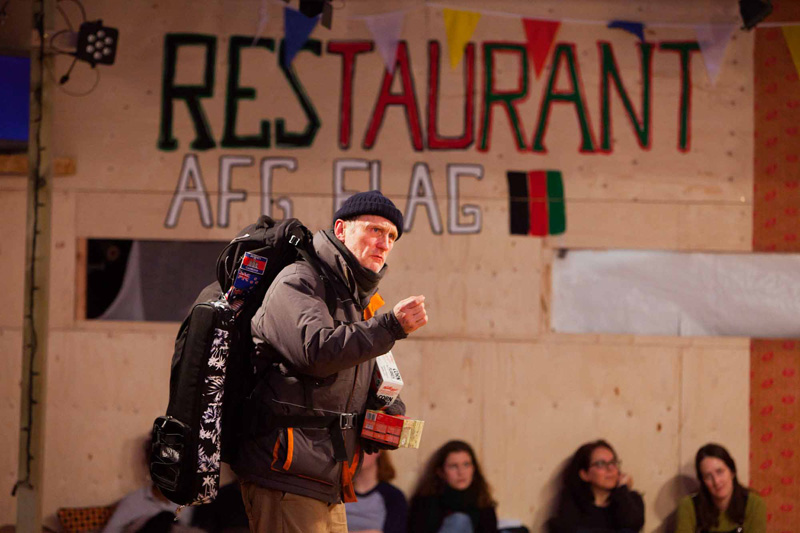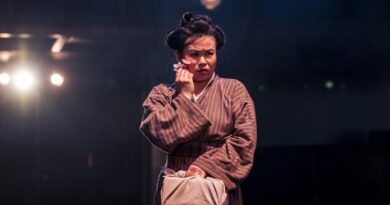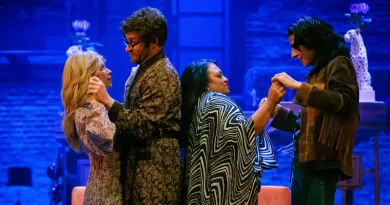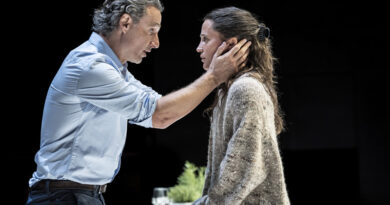“The Jungle”, Young Vic
Christine Eccles on the South Bank
17 February 2017
It is always a bit uncomfortable for me to watch a play that is based on people’s real, actual and continuing sufferings on a press night that it stuffed full of well-heeled audience members, well-intentioned metropolitan folk exclaiming: “How marvellous!” And: “Isn’t it fantastic?” And: “Ben is a wonderful actor, half-Iraqi you know …”
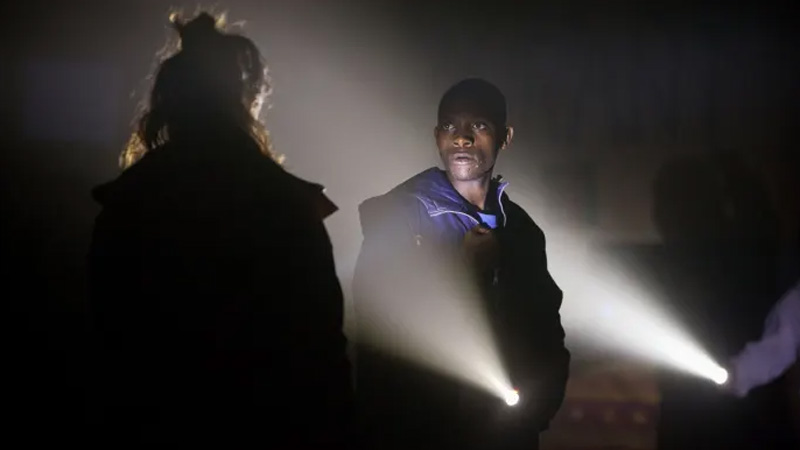
John Pfumojena.
Photo credit: David Sandison.
This play tells the story of the illegal encampment at Calais known as the “Jungle” – the temporary destination for thousands of refugees, including unaccompanied minors, fleeing hardship in their homelands and hoping to make a new and better life in the UK. The journey to Calais is long, dangerous, and difficult. The inhabitants of the Jungle were the ones who survived it — although their souls had undergone a kind of death along the way. The Jungle was short lived. Set up in 2015, it was bulldozed in late 2016. It represented the total failure of the West to have an adequate response to the humanitarian crisis: in the case of the children asking for asylum who were rejected, it demonstrated Britain’s shameful capitulation to the ugly votes behind Brexit.
We in the audience take uncomfortable, backbreaking makeshift seats at the “Afghan Flag”, an improvised restaurant made out of waste material, tarpaulin chipboard, and chutzpah. Tatty flags demarcate territorial boundaries. It’s a UN of the nation-less. Miriam Buether’s exuberant design creates a unified hospitable space out of its ramshackle component parts. The restaurant’s bread is both bread and communion and it’s handed around even amid bitter disputes. All are welcome under its patchwork roof. The Jungle was a dirty, wretched and frightening place, yet it had a certain joyfulness about it as a hub where people could and did overcome their bitter differences to recognize their common humanity, hopes and dreams. It was like Glastonbury, observes one young naïve British volunteer — but without the lavatories.
British playwrights Joe Murphy and Joe Robertson went to Calais and set up a temporary theatre named Good Chance in the Jungle in 2015. Their story has been staged in a co-production between Good Chance, the Young Vic, and the National Theatre, and is co-directed by Stephen Daldry and Justin Martin. It begins close towards the camp’s end — with death, pandemonium, flashing blue lights, and satanic storm troopers. The emotional level is pitched high; it’s not easy to follow at first with its bewildering cacophony of voices cutting quickly from scene to scene. But then Safi (Ammar Haj Ahmad) steps forward and takes control of the narrative by taking it back to where it all began, and all then starts to become clear. Safi is a former student of English literature, an affable, chilled self-mocking master of ceremonies. But as he takes the play forward through time we start to dread the inevitable replay of certain incidents coming up at its finale. Even if Safi can turn the clocks back, he can’t change the outcome.
Ensemble member.
Photo credit: David Sandison.
The Jungle is fragmentary, impressionistic, anecdotal. It makes no claim to be a definitive account. The characters though sketchy are complex. There is the remote unknowable Okot (John Pfumojena), a 17-year-old from Sudan who has murderous cultural clashes with the hyperactive cheeky Afghan youngster Norullah (Mohammad Amiri). There’s Helene (Nahel Tzegai), a natural peacekeeper. And then there’s Salar (Ben Turner), the restaurant owner who keeps Norullah under his wing and provides some kind of leadership in this über-democratic society. Like a ghost, the little girl Amal (Aliya Ali) slips in and out of the action, easy to overlook. She is nobody’s child.
Everyone’s living on their nerves, always on the look-out for “the good chance” on the motorway as a stowaway in a lorry — even though such chances often lead to death. The Jungle people’s resilience, intelligence and survival skills are in marked contrast to the motley crew of uninvited needy Brits who have volunteered following their horror at the publication of the by-now iconic photo of the Syrian toddler washed up dead on a holiday beach, But for all their ineptitude, they do at least provide some much-needed humour and serve as a chorus of impotent rage at our own government’s inadequate response. For them it’s an enormous learning curve and no doubt Alex Lowther’s convincing Etonian truant Sam will spend a lifetime processing the lessons he learned in the Jungle while bunking off school.
The first half is so vibrant, so full of community spirit, and so energetic it makes the Jungle seem a wonderful place to fetch up in forever. The action swirls all around us, for we too — like the ill-assorted British volunteers — are all refugees for the moment, fleeing from the banality of our all-to-boring reality Yay! Cue more drumming, stick-juggling, men dancing with handkerchiefs … And by the interval it’s hard to fathom why anyone would ever want to leave this wonderful place. Why dice with life and limb for a dismal bedsit in Leicester?
The second half has nowhere else to go but a bit deeper, as the various demons that affect the refugees come to the surface. The unknowable Okot looking with dead eyes emotionally recounts his journey which takes us into the heart of his darkness. Deals are done, money changes hands, chances —good or bad — are grabbed at. Things are afoot, and the British volunteers prove to be way out of their depth. It’s not a sophisticated piece of theatre, but there is extraordinary commitment from the company in giving an account of the clamouring voices from Calais who deserve to be heard. And, by the way, Ben Turner is a wonderful actor.


